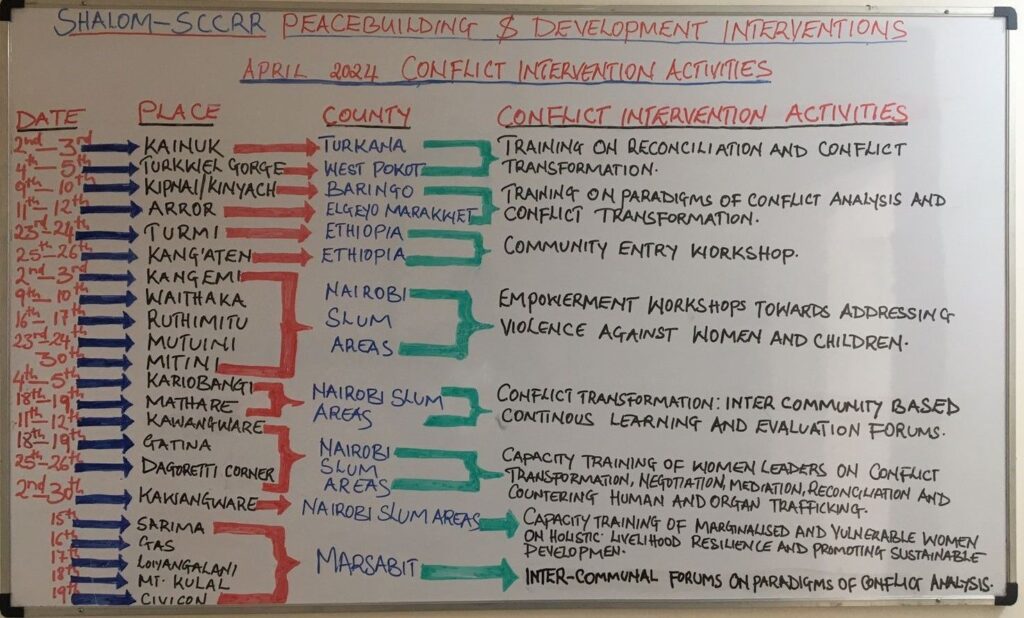SCCRR core vision is to tackle the root causes of conflict as opposed to the symptoms, beliefs and conjectures. Through research and continuous conflict analysis, Shalom has ensured that the underlying causes are understood and interventions formulated with a view of transforming the existing root causes thus inculcate positive peace among rival communities. One of the key interventions adopted by Shalom towards transforming conflict among communities has been empowerment of key community leaders with analytical skills and conflict resolution techniques.

Local leaders after an SCCRR training in Mathare
During its peacebuilding endeavors in Kenya, Shalom observed that elections have become a thorny issue which is often associated to conflict between communities. Experiences of the aftermath of 2007/2008 post-election violence created a need for Shalom to design a program that would in the subsequent years provide a framework for the organizations’ involvement in preparing Kenyan communities towards a peaceful electoral process. Through its election preparedness framework, SCCRR has engaged communities in different parts of the country in training and action plans geared towards creating greater tolerance and cohesion in the pre and during election periods as well as enabling reconciliation and conflict resolution skills in the post-election periods. In the buildup to the 2013 general elections in Kenya as well as in the aftermath of the same, SCCRR conducted a total of 52 peacebuilding workshops in 10 locations which had been classified by NCIC as exceptionally violent hotspots. Through these interventions, SCCRR managed to primarily focus on building trust with and among community opinion leaders by keenly guiding them to respond to the felt needs occasioned by the poisonous violent rhetoric and deeds of divisive politics thus strengthen their opportunities for joint collaboration towards long term peace and development.
The upcoming 2017election’s process in Kenya has not been devoid of possible signs of electoral violence and NCIC has already identified 33 counties as hotspots of election related violence. SCCRR has been on the frontline to engage communities in conflict hotspots in Nairobi County in training and action planning aimed at ensuring a peaceful electioneering period. Shalom has put intense focus on the major slum areas in Nairobi County namely, Kibera, Kariobangi North, Mathare, Korogocho and Huruma. These slums have been characterized by high magnitude of interethnic turmoil in nearly all electoral seasons since 2007 hence the reason why Shalom chose to heighten its interventions

SCCRR facilitator during a workshop with youth at Kariobangi
there. Through the collaborative efforts between SCCRR and Caritas Nairobi which is the development arm of the Catholic Church in the Archdiocese of Nairobi, the key community leaders from all these slums have been equipped with a basic understanding of conflict paradigms, conflict transformation and reconciliation as a way of enriching their analysis of the factors that might contribute towards violent conflict in this election, how to transform those factors to avert the violence and how to coexist regardless of the election outcome in the post-election period. To this end, Shalom has directly trained 12 community groups across the 5 slums reaching out to approximately 1200 key influential community leaders in a total of 43 activities which have been conducted by SCCRR between November 2016 and June 2017.
SCCRR trainings and action plans have enabled the peace monitors in the mentioned slums to engage in fre

Inter-Religious leaders at a workshop in Mathare
quently recording the signs and indicators of rising tension and triggers that may lead to electoral violence in the aftermath of the 2017 general elections in Kenya. Our participants are continuously responding to these conflict signs and indicators by carefully analyzing them after which they disseminate to key community influencers and security agents for timely action. These actions have resulted from the careful planning which has been spearheaded by the experienced SCCRR staff to assist communities living in these hotspots to put in place context specific conflict early warning and response systems/Acton Plans as a mechanism of preventing election related violent conflicts. Through SCCRR training, continuous conflict analysis and the preventive actions being undertaken by the trained community groups, the key community leaders feel empowered to prevent, manage and resolve conflict issues that are threatening to tear apart the peaceful co-existence that communities living in the slums have enjoyed. SCCRR will continue to work together with the communities of Kibera, Kariobangi, Mathare, Korogocho and Huruma slums through continuous monitoring of the early warning signs as well as assisting the communities to work towards peaceful elections and harmonious co-existence before, during and after the 2017 general elections.
By
Joyce Wamae, BA, MA (Assistant Program Manager SCCRR)

